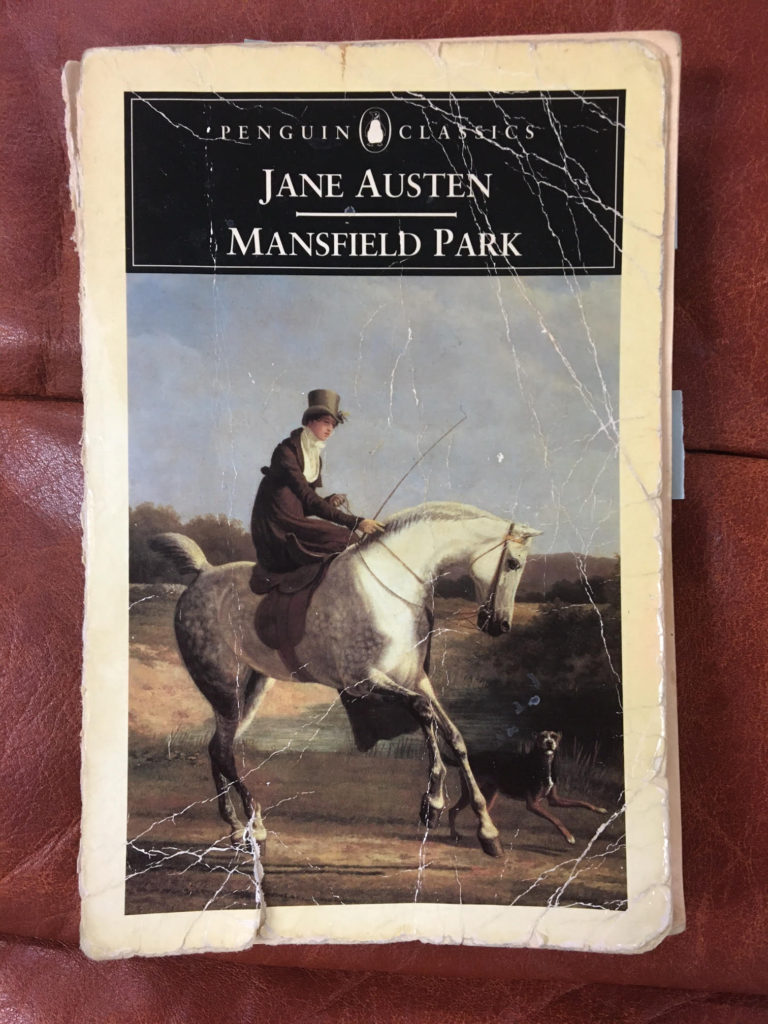As you might infer from the picture, Mansfield Park is The Mrs.’ favorite novel in the Austen canon. The cover is one bookshelf removal from falling off, the flagged passages are discolored underneath the sticky notes and the pages are as broken in as a major league baseball glove. In other words, this is the perfect copy of a book to read.
Read it I did. Though it did not supplant Pride & Prejudice as my favorite Jane novel, it was certainly worth the effort. I entreated my scholarly wife for her take on the novel and she opened my eyes to both why it is her favorite and to several subtle subplots I had missed. As I won’t do her eloquence on the subject justice in prose, I will sum up her thoughts as follows:
- Fanny Price is just like (younger) her. Overlooked and bullied, yet always expected to maintain perfect decorum, Fanny stands in for many young women that get overpowered in a hierarchical society. She has worth and wit to spare, if only anyone would take earnest notice of it. The character also provides a large dose of hope, as it all works out in the end. But it doesn’t just all work out like magic, it works out because Fanny stuck to her guns and maintained her integrity when everyone was pressing hard to get her to cave in to their expectations. Hold the line, ladies! Justice will be done.
- Sir Thomas made his fortune in the slave trade, and that drives the narrative. This one threw me a little, but it made so much sense as she laid it out. The trip to the West Indies to get his affairs in order was a thinly veiled way to say he had to go to the whip hand on his plantation. His eldest son, Tom, accompanies him and upon returning the younger Bertram continues his frivolous and prodigious lifestyle. I chalked it up to Tom’s immaturity, but The Mrs. pointed out that he acts this way out of disdain for the way his father acquired wealth. Edmund, the true white knight of the story, also rejects the inheritance (knowing it will go to Tom) and plans a life in the church. His modesty and piety counterbalance the human bondage that made his family rich. Mind blown!
- Jane Austen explains the Crawford charisma, but doesn’t let their charms seduce you, the reader. This was another point I found fascinating. Throughout the book, it is clear that both Mary and Henry Crawford have a way of enticing people’s attentions. Fanny sees through this façade the whole time, despite the fact no one else can get free of their hold. However, The Mrs. points out, the narrator doesn’t try to sway the reader with these same charms. We get a little peak behind the curtain and maintain Fanny’s perspective rather than one of the Bertram family who are so smitten. Like Mr. Wickham in Pride & Prejudice or Mr. Willoughby in Sense & Sensibility, Austen reserves her ultimate comeuppances for the silver-tongued charmers out there. As they say, a little less conversation a little more action.
I was glad to have the novel further explained to me by someone who loves it. I had to be reassured part way through that Fanny would get some love in the end, as I felt the heavy hand always upon her was almost overkill. It was a Cinderella story! Except Prince Charming is her cousin… and he’s also kind of her fairy godmother…and there aren’t any mice making her a dress… maybe this analogy isn’t a good as I thought. Read the book!
Quest Checklist:
Northanger AbbeyPride & PrejudicePersuasionSense & SensibilityMansfield Park- Emma
Lady Susan – doesn’t really count, but I did already watch Love & Friendship!

